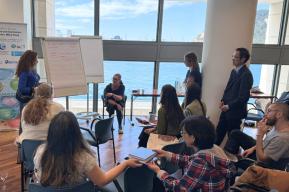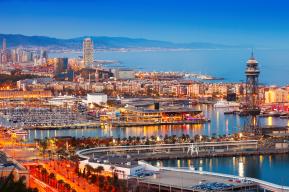News
Oceans are the real lung of the planet, says researcher

During the Conexão Oceano event held in Rio de Janeiro, scientists, athletes, journalists, influencers and artists discussed the importance of marine ecosystems for survival on Earth.
Seaweed accounts for 54% of the world's oxygen production and the seas act as climate regulators on the planet. The data are from the Brazilian Institute of Forests (Instituto Brasileiro de Florestas). Without the services provided by the ocean, the temperature could exceed 100ºC and make life on Earth unfeasible. In addition, the United Nations Food and Agriculture Organization (FAO) also indicates that fish and seafood are the main source of protein for one out of four people in the world.
Given the importance of a healthy ocean for life, about 350 people gathered last Tuesday (3 September 2019) at the Museu do Amanhã, Rio de Janeiro, to participate in the Conexão Oceano event promoted by the the Boticário Group Foundation for Nature Protection (Fundação Grupo Boticário de Proteção à Natureza) in partnership with UNESCO Intergovernmental Oceanographic Commission (IOC), UNESCO in Brazil and Museu do Amanhã. Leading the discussions and raising public awareness, there were personalities from different sectors, such as actor Mateus Solano, journalists Sônia Bridi and Paula Saldanha, actress Maria Paula Fidalgo, Olympic sailor Isabel Swan, businessman Vilfredo Schurmann, surfer Rico de Souza, researchers Frederico Brandini, Alexander Turra and Ronaldo Christofoletti, among others.
During the meeting, participants discussed the impacts suffered by the seas, as well as sharing ways to engage society around the issue, which is extremely relevant to survival, as well as to economic and social development. The audience was mainly made up of communicators, businesspersons, representatives of civil society, researchers, and students.
Professor of the Oceanographic Institute at the University of São Paulo (USP), Frederico Brandini highlighted the important role of the oceans, remembering that they are the true lung of the world. "It's where seaweed is responsible for producing most of the oxygen consumed on the planet. If we want to continue to enjoy the oceanic generosity, we need to improve the elementary school curriculum. In addition to education, another way to preserve the seas is by communicating more and better,” he emphasized.
During his speech, Mateus Solano reminded us that humans do not own the planet. "We are his children. We need to take a few steps back and understand what wrong paths we have taken in the course of history. One of them was the use of so much plastic. If we do not rethink all this, nature will continue to suffer. Thus, it is important to remember that nature does not need us. We need it," he said.
According to the executive director of the Boticário Group Foundation for Nature Protection, Malu Nunes, the main objective of the event was to bring people closer to the oceans. “We are committed to engaging society on protecting the seas and helping to build a stronger economy, broader welfare, and a conserved marine life. The idea was to detect the main challenges and inputs to achieve this goal,” she said.
Communication
The event was the first held in Brazil dedicated to communicators, influencers, and researchers, with the aim of structuring guidelines to raise awareness of society about the importance of the ocean. “Communication is a very important factor in the conservation of oceanic health. That is why the media play a major role in raising public awareness of this cause. The impact of non-conservation affects not only those who live on the coast but also those who live inland,” said the Vice President of the UNESCO-IOC in Latin America and the Caribbean, Frederico Saraiva Nogueira.
Another important point presented at the event is that oceans face problems that can negatively influence the food security of humans. "We need to reverse this situation urgently, as tragedy is imminent. The Paris Agreement and the 17 Sustainable Development Goals (SDGs) must be met worldwide. Brazil has a key role to play in the achievement of goals as it has fantastic marine diversity. This initiative to host the event plays a major role in helping to spread this content and arouse in people the commitment to defend the ocean, which is so important for our future," said the Special Secretary of the UN-Oceans, Peter Thomson.
For Alexander Turra, the coordinator of the UNESCO Chair on Ocean Sustainability, we need to reinforce the connection between the ocean lives and society. “Scientists need to be increasingly protagonists of information. It is no use just being inside the labs and not interacting with society. We need to communicate in simple and objective ways about what we stand for,” said the member of the Nature Conservation Experts Network.
Vilfredo Schurmann pointed out that “the sea is losing its breath due to excessive pollution. And I could see it around the world.” Specializing in media covers on environmental issues, Sônia Bridi stated, "civilization depends heavily on the preservation of the environment, and something needs to be done." The ideas that emerged during the Conexão Oceano event will be part of communication strategies for the conservation and sustainability of the oceans and marine life, which is the theme of the Decade of Ocean Science for Sustainable Development, proclaimed by the United Nations (UN) for the period from 2021 to 2030.
Information to the press:
UNESCO in Brazil
- Ana Lúcia Guimarães, a.guimaraes@unesco.org (61)2106-3536 or (61)99966-3287
- Leandro Bertoletti, l.bertoletti@unesco.org (61)2106-3596








